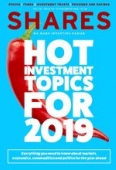Archived article
Please note that tax, investment, pension and ISA rules can change and the information and any views contained in this article may now be inaccurate.
What fund managers learned in 2018

This year has been one full of surprises for investors. From a trade war between the US and China to a stock market sell-off in October, many people will have been caught off guard by some of the curve balls which have been thrown up in recent months.
With so much uncertainty in the air, we asked the professionals what they have learned this year.
Iain Wells, manager of the Kames UK Equity Income (B4ZMVX8) fund says: ‘It may be my imagination, but the volatility of stocks seems to be increasing. This year has been difficult for active UK fund managers.’
Wells says one of the hardest things to navigate in recent months has been that there is often no rational expectation for short-term stock market and share price movements.
STAYING DISCIPLINED AMID VOLATILITY
He says: ‘The lesson is to resist the temptation to act in haste in the face of large but irrational moves in prices, even though this will feel very difficult at the time.’
At times of volatility he says sticking to an investment process becomes even more important.
In 2018 Ian Lance, manager of the RWC UK Equity Income (B4QKMZ0) fund, has learned that ‘this time it isn’t different’. Technology stocks have been at the forefront of this lesson, with many enthusiasts claiming the sector would continue to climb even after it had made stellar gains.
But as tech behemoths Apple and Amazon each reached the landmark market capitalisation of $1 trillion, the market seemed to have doubts.
Facebook has since fallen 40% from its high while Nvidia’s shares halved in a six-week period. Another group which have disappointed are consumer staple stocks.
Lance says: ‘We were told that any price could be justified for these so-called “quality compounders” but that has also turned out to be untrue.’
IT IS NEVER DIFFERENT THIS TIME
He points to stocks such as British American Tobacco (BATS), Kraft Heinz and Anheuser Busch, whose share prices have halved from their peaks.
Lance adds: ‘The four most expensive words in investing are still “this time is different” and 2018 has demonstrated that once more.’
Will Lough, manager of the River & Mercantile UK Dynamic Equity (B7H1R58) fund, thinks 2018 has been a good reminder in the importance of ‘process, patience and position size’.
He says: ‘Macro-dominated markets are often driven by headlines and a news cycle that favours conjecture over facts.’
BREXIT BRUISES MARKETS
Lough says keeping a focus on the long-term has been especially important amid short-term volatility.
In tough times he tries to remember the investment adage that the stock market is, in the short term, a sentiment-driven voting machine, but over the long term it is a weighing machine driven by whether companies are delivering growth.
He adds: ‘(Veteran investor) Anthony Bolton once wrote: don’t be too stubborn with your views but don’t lose all conviction.’
Mark Swain, co-manager of the Smith & Williamson Enterprise (B5NY4X4) fund, has been mindful of how Brexit has affected the market this year.
He says: ‘One lesson we have learnt is that the market’s logic on Brexit remains extremely fuzzy, despite the fact that we are now much closer to exit day.’
He believes 2018 has been a lesson to investors in not trying to pick the winners and losers from an event when it is not yet clear how it will play out.
He adds: ‘This makes no sense and we don’t think there is any mileage in trying to make heroic assumptions about Brexit, currencies or any of the broader macro risks.’
THE IMPORTANCE OF DIVERSIFICATION
James Mee, manager of the Waverton Multi Asset Income (BQ1KPQ1) fund, says 2018 has been a lesson in the importance of diversification.
He has been increasing his allocation to alternative assets such as infrastructure, property, specialist lending and commodities to try and mitigate some of the effects of market volatility.
He says: ‘Achieving positive returns from a traditional portfolio of equities and bonds will be challenging going forward and many of these alternative assets are attractively priced and have lower correlation to the stock market volatility, which we expect to continue.’
Nathan Sweeney, manager of the Architas Active Growth (B88MN82) fund, says this has been a year when many investors will likely have learned about the importance of being nimble and investing tactically.
He says: ‘For the past 10 years, investors have been able to simply buy the index and watch it go up but that will not have happened this year.’
CASH IS KING
He has been adjusting his cash holdings in recent months amid the market volatility, holding as much as 10% of assets in cash in September when he was concerned about a market sell-off and reducing that position down to around 2% after the volatility in October when there were more buying opportunities.
Sweeney says: ‘Being nimble is something investors should consider and it’s important to realise that in periods of volatility, cash is king.’
Important information:
These articles are provided by Shares magazine which is published by AJ Bell Media, a part of AJ Bell. Shares is not written by AJ Bell.
Shares is provided for your general information and use and is not a personal recommendation to invest. It is not intended to be relied upon by you in making or not making any investment decisions. The investments referred to in these articles will not be suitable for all investors. If in doubt please seek appropriate independent financial advice.
Investors acting on the information in these articles do so at their own risk and AJ Bell Media and its staff do not accept liability for losses suffered by investors as a result of their investment decisions.

 magazine
magazine









